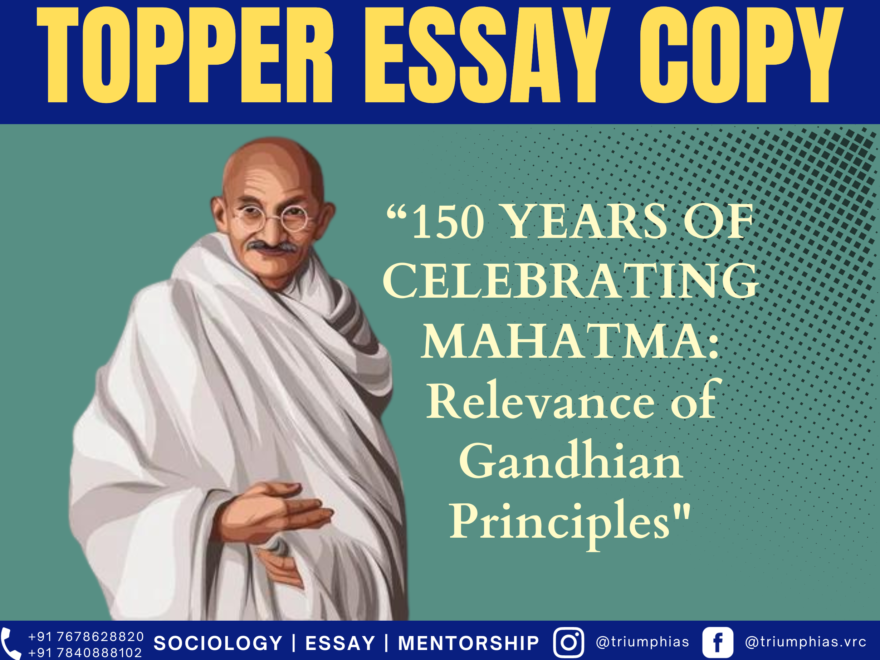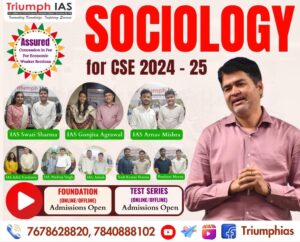IAS,UTKARSH DWIVEDI

Essay Topic:
“150 YEARS OF CELEBRATING MAHATMA: Relevance of Gandhian Principles”
(Relevant for Essay Writing for UPSC Civil Services Examination)
“150 YEARS OF CELEBRATING MAHATMA: Relevance of Gandhian Principles”It is August of 1947. The seminal year when India awoke to freedom. The task at hand in front of our leaders is to make a constitution for our country that would form the basis of India. But the question troubling our leaders is, what then would form the basis of our constitution itself? To solve this dilemma, the great Dalit leader, Babu Jagjivan Ram goes to meet Gandhi at his ashram, where Gandhi is busy spinning his charkha. Babu Jagjivan Ram asks, “Bapu, what should be the one thing I should keep in mind when I sit in the constituent Assembly?” It is here that Gandhi gives his ever eternal Talisman – “When in doubt remember the face of the poorest person you have seen and ask yourself whether the action you are going to perform would be of any help to the poor man.” Babu Jagjivan Ram’s eyes are filled with tears. He takes blessings of Bapu and leaves. In South Africa, he fought for the rights of indentured laborers of Indian origin. After initial success, he came to India, where through movements like Champaran Satyagraha to Non-cooperation movement to civil disobedience movement to finally Quit India movement, he led India from slavery to liberation. In all his struggles, he developed ideas, philosophies, dogmas, and principles that hold relevance even today. Let us take them one by one. Gandhi is synonymous with the word “Nonviolence”. The United Nations celebrates the International Day of Nonviolence on 2nd October every year, the birth of the Mahatma. Non-violence as an idea is more than relevant in today’s world because we are witnessing civil wars in the Middle East, instances of terrorism in Europe, India, New Zealand, Afghanistan, murders in the USA [due to liberal arms laws], and riots in India between Hindus and Muslims, with one as recent as in Delhi, 2020. These instances show that the answer to violence is not more violence but non-violence. To achieve non-violence Gandhi advocated satyagraha. This means the right to protest but while keeping complete adherence to truth and non-violence. Gandhi’s method of satyagraha was used by Anna Hazare in India against corruption movement, wherein without resorting to violence, he sat on a hunger strike and forced the government in power to pass the Jan Lokpal Bill. The idea of corruption is closely related to the excessive needs of man. Gandhi said “There is enough for a man’s need, but not enough for a man’s greed”. This greed of man is fulfilled through rapid capitalism and industrialization. Gandhi was against the above two phenomena. For him machine must augment man’s efforts but not replace man. We can see that Industrial Revolution 4-0 is rendering many people jobless. In fact, Yuval Noah Harari in his book “21 Lessons for the 21st Century” says “workers will not rise against the person who gives low wages but against the person who doesn’t need them”. This brings us to the rights of the worker class. Gandhi through his Ahmedabad mill strike fought for workers. His ideals have been incorporated in the Directive Principles of state policy that talk about workers’ participation in industries and provision of living wage to workers. These principles have been incorporated in the recent labor codes passed by the government that strive to build a harmonious relationship between the workers and owners. This relationship between two classes, i.e., the haves and the have-nots brings us to Gandhi’s theory of “trusteeship”. Unlike Marx, Gandhi does not talk about abolishing private property but like Aristotle he talks about private ownership and common use. This synthesis of “private” and “common” is the essence of a “welfare stick”. And a welfare state is what is the aim of our constitution. Mentioning of constitution, most of its articles are derived from Gandhian thought and are supremely relevant today. Article 14 to 18 talks about equality. Gandhi had a special focus on treating women at par with men and treating Dalits at par with Brahmins. This is highly relevant today due to instances of domestic violence, rape and degradation of woman in today’s world. Similarly instances of violence against Dalits make headlines almost every day. These are employed in menial tasks that are not respected in society. Here Gandhi’s theory of “bread labor” must be mentioned which asks for treating every person with respect even though he may be performing the most basic of tasks. We should ask ourselves do we respect the sweepers or people who collect garbage? Talking of garbage, the Swachh Bharat Mission to make India open-defecation free and clean was the dream of Gandhi that the country is on the path to fulfill. Apart from “Swachh Bharat”, the other most heard phrase is “Atma Nirbhar Bharat”. The idea of “Atma Nirbharta” founds its basis in the charkha of Gandhi wherein Gandhi made his own cloth spinning the charkha. The spinning of charkha is analogous to the spinning of the Ashoka Chakra. This spinning charkha symbolizes “India on the move.” And the spinning charkha symbolizes the cycle of life. A life that must be guided by Gandhian principles. Hence not just after 150 years, but I can imagine a student writing an essay on the topic “1500 years of the Mahatma: Relevance of Gandhian principles”. Because the Mahatma is eternal. |
To master these intricacies and fare well in the Sociology Optional Syllabus, aspiring sociologists might benefit from guidance by the Best Sociology Optional Teacher and participation in the Best Sociology Optional Coaching. These avenues provide comprehensive assistance, ensuring a solid understanding of sociology’s diverse methodologies and techniques
Meta Tags:
Urbanisation, Blessing, Disguise, Economic Growth, Cultural Diversity, Environmental Challenges, India, Social Inclusion, Sustainable Development, SDG Goals, Urbanization is a blessing in disguise, Laxman Tiwari, Laxman Tiwari upsc, Laxman Tiwari CSE, Laxman Tiwari Essay copy, Laxman Tiwari Essay test copy

Why Vikash Ranjan’s foundation Classes for Essay?
Proper guidance and assistance are required to learn the skill of writing essay topics in CSE examination. VIKASH RANJAN SIR at TRIUMPH IAS guides students according to the Recent Trends of UPSC, making him the Best Essay Teacher for Essay writing UPSC.
At Triumph IAS, the Best Essay Writing Coaching platform, we not only provide the best study material and applied classes of Essay for IAS but also conduct regular assignments and class tests to assess candidates’ writing skills and understanding of the subject.
Choose The Best Essay Writing Teacher for IAS Preparation and Know our Approach for Essay?
- The Programme is Planned & Executed in a Way that You Write a good Essay for obtaining Effective Score of 140 Plus.
- In this programme we provide Classes on
- How to INTRODUCE The Topic in Context of the THEME of the Essay
- How to Elaborate & Explain the Topic-Theme on Temporal Scale & Sectoral Scale as well as Intellectual Scale in the MAIN BODY of the Essay.
- How to Sum up the Topic in CONCLUSION in Context of the Essay Topic Theme.
- ︎We will Teach You How to use the Knowledge Matrix of General Studies & Optional to write a Good Essay more Logically and Coherently.
- After the Classes You have to “Write to Learn & Learn to Score” .This means You have to Write the Essay Test Papers & Learn from the Feedback & Discussions.
Why Essay is Important and What We Offer in “Essay Test Series”?
- Triumph’s Essay Upgradation Test Series (Under Personal Guidance of Vikash Ranjan Sir) doesn’t only focus on improving student’s linguistic skills but also focus on improving student’s ability to comprehend the topic-sentence (subject) recall & relate the facts, concepts, propose thesis-statements, and logically assimilate the ideas & counter ideas with clarity in expression on temporal & Sectoral Scales of knowledge.
- Further students are provided one-on-one INTERACTION* Session with Vikash Ranjan Sir. Students get personal feedback on their strength and weaknesses, regarding what is ‘good about their essay and what more should be done to make it a better one’ by Vikash Ranjan Sir.
Why to take up this “Essay Test Series and Foundation” Course?
- Essay is Low hanging Fruit. Marks in Essay is Effectively Contributing in Final Selection in New Pattern of Mains Exam. With a Well Developed ‘Knowledge Matrix and Rigorous Practice’, One can Score upto 160 + in Essay. So IAS Aspirants should never Ignore Essay Preparation
- Inculcating Writing Competency in Essay for IAS, which is Different from Essay in English, Essay in School and College.
Follow us :
🔎 https://www.instagram.com/triumphias
🔎https://www.youtube.com/c/TriumphIAS
🔎https://t.me/VikashRanjanSociology
Find More Blogs…
| Compare and contrast Karl Marx’s and Max weber’s | Karl Marx- Historical Materialism |
| Position of Women In the Modern Indian Society | Sociology: Social system and pattern variables |
keyword: Relevance of Gandhian Principles, Relevance of Gandhian Principles, Relevance of Gandhian Principles, Relevance of Gandhian Principles, Relevance of Gandhian Principles, Relevance of Gandhian Principles, Relevance of Gandhian Principles, Relevance of Gandhian Principles, Relevance of Gandhian Principles, Relevance of Gandhian Principles, Relevance of Gandhian Principles, Relevance of Gandhian Principles, Relevance of Gandhian Principles, Relevance of Gandhian Principles, Relevance of Gandhian Principles, Relevance of Gandhian Principles, Relevance of Gandhian Principles, Relevance of Gandhian Principles, Relevance of Gandhian Principles, Relevance of Gandhian Principles,


